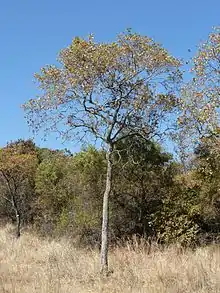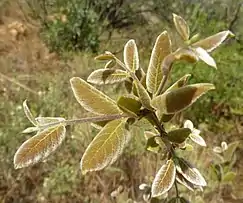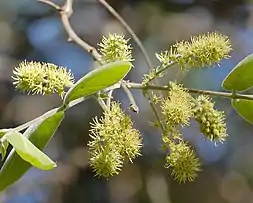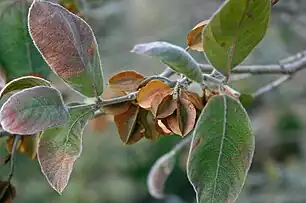Combretum molle
Combretum molle, the velvet bushwillow, is a medium to large tree species in the genus Combretum found in western, eastern and southern Africa.
| Velvet bushwillow | |
|---|---|
 | |
| habit, winter | |
| Scientific classification | |
| Kingdom: | Plantae |
| Clade: | Tracheophytes |
| Clade: | Angiosperms |
| Clade: | Eudicots |
| Clade: | Rosids |
| Order: | Myrtales |
| Family: | Combretaceae |
| Genus: | Combretum |
| Species: | C. molle |
| Binomial name | |
| Combretum molle | |
The larvae of Parosmodes morantii and Acalyptris molleivora feed on C. molle. It is recorded to contain antioxidants such as punicalagin,[1] which is also found in the other Myrtale pomegranates (Punica granatum), a somewhat related plant. It also contains the 1alpha-hydroxycycloartenoid saponins mollic acid glucoside[2] and mollic acid 3β-D-xyloside.[3]
Extracts from the bark of C. molle show antibacterial and antifungal[4] as well as in vitro antiprotozoal activities.[1] Mollic acid glucoside shows cardiovascular effects.[2]
 new flush
new flush spring foliage and inflorescences
spring foliage and inflorescences winter foliage and fruit
winter foliage and fruit
References
- Asres, K.; Bucar, F.; Knauder, E.; Yardley, V.; Kendrick, H.; Croft, S. L. (2001). "In vitro antiprotozoal activity of extract and compounds from the stem bark of Combretum molle". Phytotherapy Research. 15 (7): 613–617. doi:10.1002/ptr.897. PMID 11746844. S2CID 24511496.
- Ojewole, J. A. (2008). "Cardiovascular effects of mollic acid glucoside, a 1alpha-hydroxycycloartenoid saponin extractive from Combretum molle R Br ex G Don (Combretaceae) leaf". Cardiovascular Journal of Africa. 19 (3): 128–134. PMC 3974560. PMID 18568171.
- Pegel, K. H.; Rogers, C. B. (1985). "The characterisation of mollic acid 3?-D-xyloside and its genuine aglycone mollic acid, two novel 1?-hydroxycycloartenoids from combretum molle". Journal of the Chemical Society, Perkin Transactions 1: 1711. doi:10.1039/P19850001711.
- Asres, K.; Mazumder, A.; Bucar, F. (2006). "Antibacterial and antifungal activities of extracts of combretum molle". Ethiopian Medical Journal. 44 (3): 269–277. PMID 17447394.
External links
 Data related to Combretum molle at Wikispecies
Data related to Combretum molle at Wikispecies- Combretum molle in West African plants – A Photo Guide.
Wikimedia Commons has media related to Combretum molle.
This article is issued from Wikipedia. The text is licensed under Creative Commons - Attribution - Sharealike. Additional terms may apply for the media files.